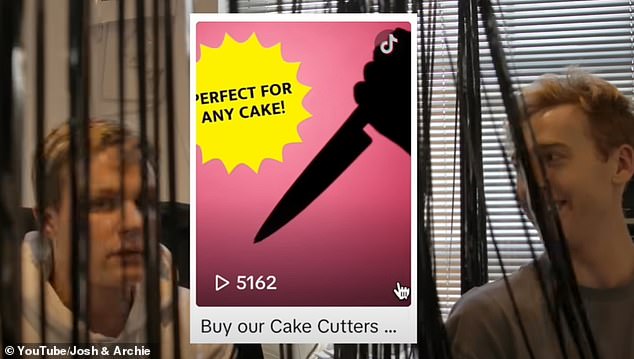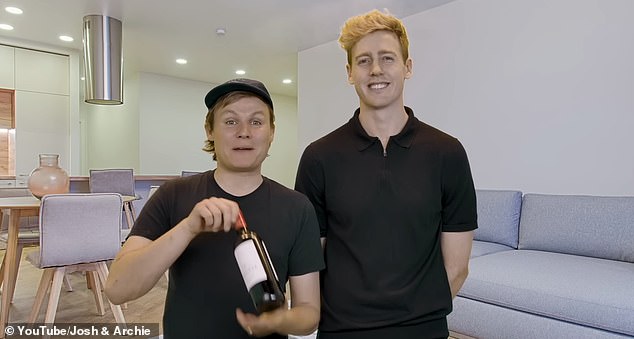YouTube pranksters reveal how social media giants allow ads for vapes, knives, alcohol and gambling to children
YouTube pranksters claim to have exposed how social media giants allow ads for vapes, knives, alcohol and gambling to children.
In their latest stunt, popular duo Josh and Archie, who have 1.5 million followers, filmed fake ads and paid to post them on Instagram, TikTok and X.
Despite a ban on the products advertised to teens, all of them – including one from a fake company called ‘Stabby Stabby Choppy Choppy Kitchen Knives’ – passed at least one of the platforms’ review processes and went live.
Advertising data showed that the YouTube duo were able to reach tens of thousands of teenagers, with many clicking through to websites to try to buy the products over 18.
According to a study by Harvard University last year, social media platforms earn almost £9 billion a year from advertising aimed at children and teenagers.
In their latest stunt, popular duo Josh and Archie, who have 1.5 million followers, filmed fake ads and paid to post them on Instagram, TikTok and X.
Co-host Archie Manners said their latest experiment aimed to find out “how much effort platforms really put in” to stop young people seeing unhealthy ads – “It turns out not much at all.”
The YouTubers – who host the podcast ‘Straight to the Comments!’ of Mail – setting up five companies with provocative titles, such as vape company ‘HELF BARS’, another for hookahs called ‘Flower Pots for Weed(s)’, and one for alcohol called ‘Grape Juice’.
They then filmed advertisements for each of them, showing the products in the style of children’s television show presenters, but with provocative slogans such as ‘the healthy alternative to antidepressants’.
After this, they tried uploading them all to Instagram, TikTok and

Advertising data showed the YouTube duo were able to reach tens of thousands of teens, with many clicking through to websites to try to buy the products over 18
According to the YouTubers, all five immediately went up on X, while Instagram allowed all of them on the platform, but after a longer review process.
On TikTok, where all products are banned, four advertisements were rejected.
However, one of the ads – Helf Bars, a fake vape company – passed the review checks.
The advert cost £24 and was viewed 12.2k times before the YouTubers said they removed it two days later.
Combined, the ads – which cost just £319 – were viewed more than 100,000 times – and 85 percent of these were between 13 and 17 years old.
Of the video, co-host Josh Pieters says, “So it looks like social media companies are really more concerned about their revenue than they are about spending money on, say, actually vetting their ads – surprise, surprise.”
The ads linked to real websites, but they had no live stores, so no one could actually buy the products.

The ads linked to real websites, but they had no live stores, so no one could actually buy the products
Instagram says it bans all products advertised by YouTubers.
It uses an algorithm – and sometimes people – to rate and monitor ads when they appear on the platform.
Advertisers are expected to be subject to restrictions if they fail to comply, but the company does admit: “Our review process may not detect all policy violations, and ads remain subject to review and re-review and may be withdrawn at any time.” rejected for violating our policies. ‘
TikTok said the video “intentionally misrepresents the facts” and that its advertising policies were “properly enforced.”
The tech giant said it does not allow disinformation that could cause “significant harm” to users or society, and products that are “controversial, distasteful, violent or dangerous,” including weapons.
All ads go through “multiple levels of review” before being approved, although the company openly admits that it “will not recognize every instance of infringing content.”
X was contacted for comment.
